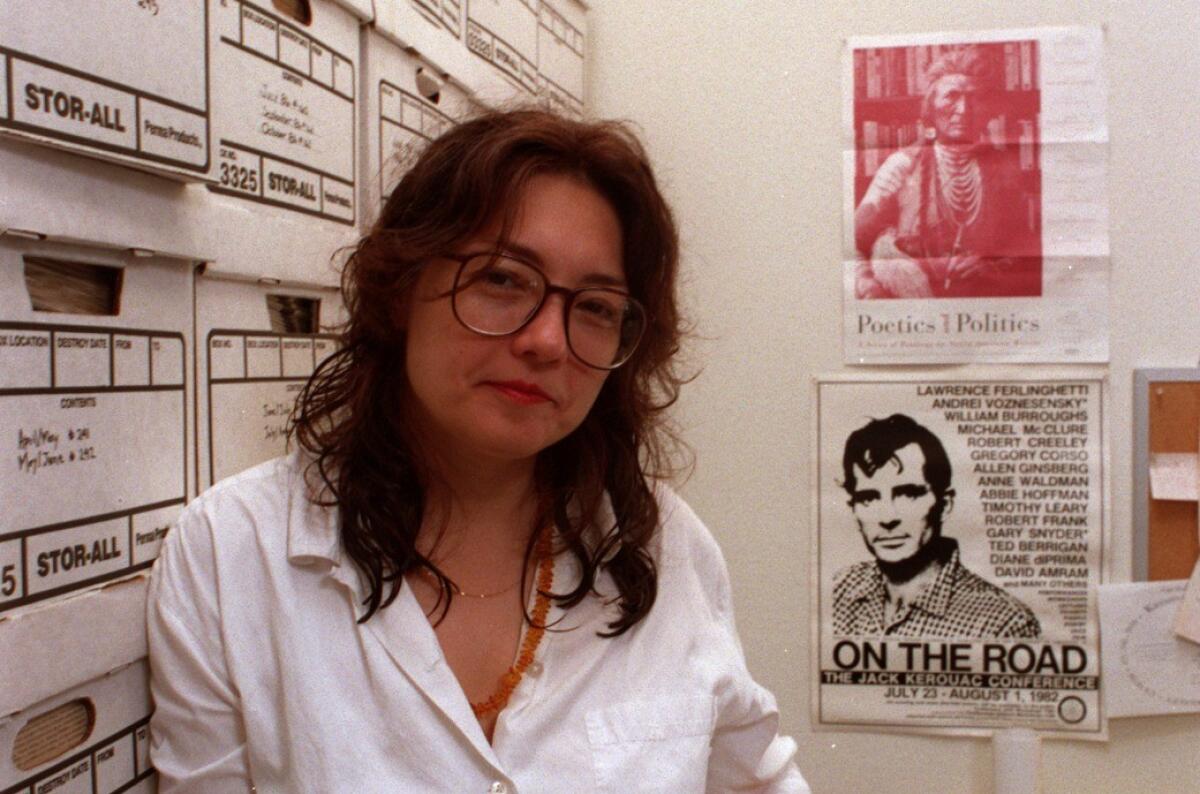Berkeley-based Poetry Flash faces an uncertain future

Joyce Jenkins, photographed in 1996 at the offices of Poetry Flash.
- Share via
Poetry Flash, the venerable Berkeley-based poetry newsletter, is in financial trouble and faces possible eviction.
As contributing editor Dawn-Michelle Baude has written in an e-mail circulated to supporters, “Poetry Flash is in dire circumstances, partly due to a $600.00 rent increase, taking effect on November 1, 2015.” That’s an increase of 27% over the current rent.
“Unfortunately,” Baude continues, by way of explanation, “Poetry Flash … [is] situated in a live-work space in Berkeley that is EXEMPT from rent control.”
The goal, then, is to help raise rent money in the short term through small donations and also launch “an online Kickstarter or Indiegogo campaign to keep Poetry Flash in its current location until grant monies come in.”
Poetry Flash was founded in 1972 and has been edited by Joyce Jenkins since 1978. Originally a monthly tabloid with a circulation of 22,000, it went digital in 2010. A look at the most recent issue reveals the publication’s signature mix of poetry, criticism and listings: an interview with Dorianne Laux by Meg Reynolds, a vivid remembrance of Wanda Coleman by Stephen Kessler, poems by Julia Vinograd, Bill Mayer and Ruth Thompson, reviews and featured events.
“Poetry Flash,” suggests Gloria Frym, a poet and professor at California College of the Arts, via email, “is THE calendar and review organ for poetry all over the country, and especially California and the Bay Area. … Though there are many poets in California, the regular media rarely carries listings of readings or poetry events. And Poetry Flash is an important review medium. Articles are written by other poets and writers.”
I agree. I first discovered Poetry Flash as a young poet living in San Francisco; it gave me a sense of community, the feeling that I might be part of something larger, that poetry counted for something in this world.
For Poetry Flash, the financial issues started with the death of Jenkins’ husband and collaborator, Mark Baldridge, from cancer in December 2014. Baldridge had actively worked to expand the publication’s footprint, functioning as both grant writer and advertising director, and creating the Watershed Environmental Poetry Festival.
His loss, then, is double-sided: both as a husband and a partner in the magazine.
“Joyce Jenkins is a slugger,” Baude notes in a follow-up email, “— you couldn’t bring out over 30 years of monthly hardcopy about poetry without having grit. … That said, the loss of Joyce’s husband and development writer has been devastating.”
In some sense, this is a story about the relationship of art to capital, especially in a place such as the Bay Area, where the tech revolution has pushed basic living costs through the roof. But even more, it is a story about priorities, what we find important, how we feed not just our wallets but also our souls.
The publication has sponsored a reading series in Berkeley for more than three decades, as well as the Northern California Book Awards.
“It is safe to say,” Baude insists, “that the Northern California poetry scene and literary fiction scene would not have developed the way they have over the last 30 years without Poetry Flash’s constant, continual support of books.”
Twitter: @davidulin
More to Read
Sign up for our Book Club newsletter
Get the latest news, events and more from the Los Angeles Times Book Club, and help us get L.A. reading and talking.
You may occasionally receive promotional content from the Los Angeles Times.







